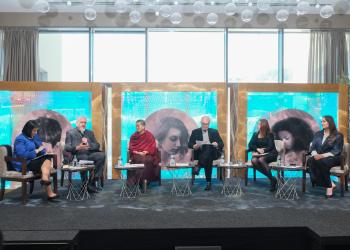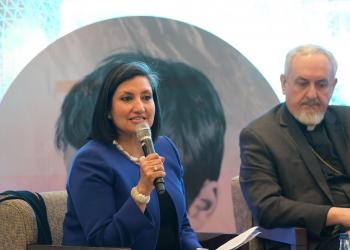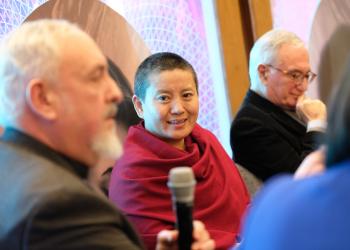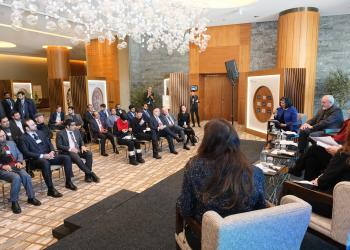BIC participates in Davos on the role of faith in building safer communities
The Baha’i International Community’s Principal Representative has moderated a panel at the World Economic Forum in Davos alongside experts and faith leaders on the role of faith in safeguarding communities and globalization.
The panel featured Buddhist, Christian and Jewish religious leaders, a child psychiatrist, and a member of the United Arab Emirates based Interfaith Alliance for Safer Communities (IASC)—the organizers of the panel.
Conversations centered around the role that faith leaders can play in safeguarding their communities, in particular from threats of online child sexual abuse and violent extremism.
Other themes included how to ensure that interfaith dialogue turns into action and the experiences of faith-based organizations in partnering with government agencies, private sector entities and civil society.
“Every society raises its children within an intricate constellation of values, priorities and convictions. Many of these contribute to the healthy development of both individuals and society, ” said Bani Dugal, Principal Representative of the Baha’i International Community to the United Nations and moderator of the panel.
“Yet messages of a very different sort have been gaining prominence in recent times. Gratification of personal desire is relentlessly promoted in the name of choice. Self-interest is acclaimed without apology.
“Relationships are becoming increasingly transactional and monetized. The proliferation of pornography, no less than the deluge of sexual imagery used to promote virtually every product and service imaginable, provide just a glimpse of the magnitude of the challenge before us.”
Ms. Dugal added: “However, history has shown us that religion is one of the few social forces with the power to overcome widespread challenges such as these. At its best, religion releases a motivation towards nobility and a concern that transcends mere self-interest.
“In this light, faith leaders and the communities they guide have a responsibility not only to hold themselves to a higher standard, but to strive toward a level of conduct that is exemplary in its integrity and transparency.”
Panelists explored further questions including how faith leaders can take an active part in combating crime, how to build capacity within the community to work with individuals and institutions and how to combine the knowledge systems of science and religion in order to make a difference in the world.
The event marked the first stop in a global tour of the Interfaith Alliance Exposition, an exhibition that provides an interactive way of communicating the different aspects of online sexual abuse and exploitation of children, and the role that faith leaders can play in combating it.
The process leading up to the panel involved a two-year effort that began in the Vatican in 2017 with the Declaration of Rome endorsed by Pope Francis and led to a forum held in Abu Dhabi in November 2018.
As part of the process, six workshops with more than 270 attendees from over 30 countries were held. Future fora will explore other risks that impact the safety and security of communities including extremism, radicalization and human trafficking among other themes.







